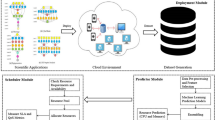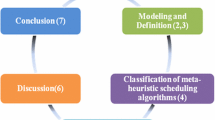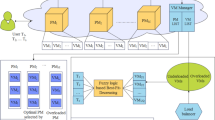Abstract
Natural and environmental sciences are one of the scientific domains which seek a lot of attention as it requires high performance computation and large storage space. Cloud computing is such a platform that offers a customizable infrastructure where scientific applications can provision the required resources prior to execution. The elasticity characteristic of cloud computing and it’s pay-as-you-go pricing model can reduce the resource usage cost for cloud client’s. The various services offered by the cloud providers and the extravagant developments in the domain of cloud computing has attracted many scientists to deploy their applications on cloud. The change in number of tasks of scientific application directly affects the demand of cloud resources. Therefore, to handle the fluctuating demand of resources, there is a need to manage the resources in an efficient manner. This research work focuses on the design of a prediction based scheduling approach which maps the tasks of scientific application with the optimal VM by combining the features of swarm intelligence and multi-criteria decision making approach. The proposed approach improves the accuracy rate, minimizes the execution time, cost and service level agreement violation rate in comparison to existing scheduling heuristics.





Similar content being viewed by others
References
Chapman C, Musolesi M, Emmerich W, Mascolo C (2007) Predictive resource scheduling in computational grids. In: 2007 IEEE international parallel and distributed pro-cessing symposium. IEEE, pp 1–10
Shen Y (2015) Virtual resource scheduling prediction based on a support vector machine in cloud computing. In: 2015 8th international symposium on computational intelligence and design (ISCID), vol 1. IEEE, pp 110–113
Reig G, Alonso J, Guitart J (2010) Prediction of job resource requirements for deadline schedulers to manage high-level slas on the cloud. In: 2010 9th IEEE international symposium on network computing and applications. IEEE, pp 162–167
Huang Q, Shuang K, Xu P, Li J, Liu X, Su S (2014) Prediction-based dynamic resource scheduling for virtualized cloud systems. J Netw 9(2):375–383
Borkowski M, Schulte S, Hochreiner C (2016) Predicting cloud resource utilization. In: 2016 IEEE/ACM 9th international conference on utility and cloud computing (UCC). IEEE, pp 37–42
Li J, Ma X, Singh K, Schulz M, de Supinski BR, McKee SA (2009) Machine learning based online performance prediction for runtime parallelization and task scheduling. In: 2009 IEEE international symposium on performance analysis of systems and software. IEEE, pp 89–100
Kang S, Veeravalli B, Aung KMM (2018) Dynamic scheduling strategy with efficient node availability prediction for handling divisible loads in multi-cloud systems. J Parallel Distrib Comput 113:1–16
Ghobaei-Arani M, Jabbehdari S, Pourmina MA (2018) An autonomic resource pro-visioning approach for service-based cloud applications: a hybrid approach. Futur Gener Comput Syst 78:191–210
Choudhary A, Gupta I, Singh V, Jana PK (2018) A GSA based hybrid algorithm for bi-objective workflow scheduling in cloud computing. Futur Gener Comput Syst 83:14–26
Zhang N, Yang X, Zhang M, Sun Y, Long K (2018) A genetic algorithm-based task scheduling for cloud resource crowd-funding model. Int J Commun Syst 31(1):e3394
Ober I, Palyart M, Bruel J-M, Lugato D (2016) On the use of models for high-performance scientific computing applications: an experience report. Softw Syst Model 1–24:2016
Monteiro AFG (2015) HPC management and engineering in the hybrid cloud. Doctoral dissertation, Universidade de Aveiro, Portugal, pp 1–153
Liu J, Pacitti E, Valduriez P, Mattoso M (2015) A survey of data-intensive scientific workflow management. J Grid Comput 13(4):457–493
Mastelic T, Fdhila W, Brandic I, Rinderle-Ma S (2015) Predicting resource allocation and costs for business processes in the cloud. In: 2015 IEEE world congress on services. IEEE, pp 47–54
Bala A, Chana I (2015) Intelligent failure prediction models for scientific workflows. Expert Syst Appl 42(3):980–989
Pandey S, Wu L, Guru SM, Buyya R (2010) A particle swarm optimization-based heuristic for scheduling workflow applications in cloud computing environments. In: 2010 24th IEEE international conference on advanced information networking and applications. IEEE, pp 400–407
Lati MSA, Abdul-Salaam G, Madni SHH et al (2016) Secure scientific applications scheduling technique for cloud computing environment using global league championship algorithm. PLoS ONE 11(7):1–18
Kansal NJ, Chana I (2015) Artificial bee colony based energy-aware resource utilization technique for cloud computing. Concurr Comput Pract Exp 27(5):1207–1225
Emeakaroha VC, Netto MA, Calheiros RN, Brandic I, Buyya R, De Rose CA (2012) Towards autonomic detection of SLA violations in cloud infrastructures. Futur Gener Comput Syst 28(7):1017–1029
Behzadian M, Otaghsara SK, Yazdani M, Ignatius J (2012) A state-of the-art survey of topsis applications. Expert Syst Appl 39(17):13051–13069
Jahanshahloo GR, Lot FH, Izadikhah M (2006) An algorithmic method to extend topsis for decision-making problems with interval data. Appl Math Comput 175(2):1375–1384
Kaur G, Bala A (2021) OPSA: an optimized prediction based scheduling approach for scientific applications in cloud environment. Clust Comput 2021:1–20
Ramakrishnan L, Gannon D (2008) A survey of distributed work ow characteristics and resource requirements. Indiana University, pp 1–23
Ramakrishnan L, Plale B (2010) A multi-dimensional classification model for scientific workflow characteristics. In: Proceedings of the 1st international workshop on work-flow approaches to new data-centric science. ACM, p 4
Kaur G, Bala A, Chana I (2019) An intelligent regressive ensemble approach for pre-dicting resource usage in cloud computing. J Parallel Distrib Comput 123:1–12
Team RDC (2018) The R project for statistical computing. https://www.r-project.org/
Acknowledgements
One of the authors, Gurleen Kaur, acknowledges the Maulana Azad National Fellowship, UGC, Government of India, for awarding the scholarship which helped to avail the required resources to carry out this research work.
Author information
Authors and Affiliations
Corresponding author
Rights and permissions
About this article
Cite this article
Kaur, G., Bala, A. Prediction based task scheduling approach for floodplain application in cloud environment. Computing 103, 895–916 (2021). https://doi.org/10.1007/s00607-021-00936-8
Received:
Accepted:
Published:
Issue Date:
DOI: https://doi.org/10.1007/s00607-021-00936-8
Keywords
- Resource prediction
- Resource scheduling
- Cloud environment
- Virtual machine
- Ensembling
- Machine learning
- Quality of service




